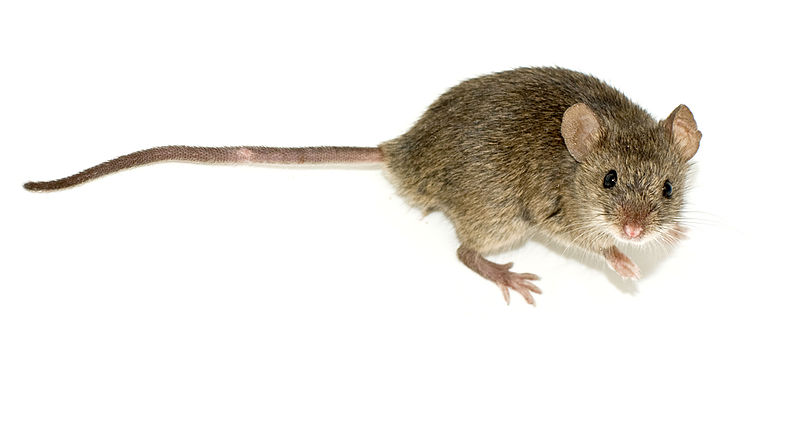Basque sagu, sat- 'mouse'
is a word found in compounds such as satandera (B, G), satandre
(S, R) 'weasel' (and(e)re
'lady'), satitsu (G, HN) 'shrew'
(itsu 'blind'), sat(h)or 'mole' (second member unknown) and saguzar
(B, G) 'bat' (zahar
'old'), and which has cognates in Afrasian: Akkadian šikkû 'mongoose', Amharic ǝkokko
(aškokko, ǝškokko) 'rock hyrax', Ge'ez sˁǝkˁwǝnkˁwǝn,
sˁǝkˁwǝskˁwǝn 'field mouse; a kind of
lizard'1, Central Chadic *Sakw-
'squirrel; dog'2, Omotic *sakw/*sikw
'chameleon; bat', Kartvelian *tsiqˀw- 'squirrel, mouse'
(Georgian ciqˀwi 'squirrel'), Dravidian *tśikk- 'mouse', Old Turkish čekün 'young of marmot', Tungus čekše 'tarbagan (Marmota sibirica)'. Also related are Etruscan seχ3, Thracian súkhis and IE *dhug-h₂ter 'daughter'.
Although Bengtson
links the Basque word to Caucasian *tsa:rggwɨ:(~ -ǝ:,-a:) 'weasel, marten' (see here),
from which Starostin thinks the Kartvelian word was borrowed, in my opinion
this is a genuine Eurasiatic root which in some languages (Kartvelian4,
Dravidian, Altaic5) conflated with a phonetically similar word
'small'6, probably for tabooistic reasons.
______________________________________________
1 Quoted by Dolgoposky (ND 310a). See
also W. Leslau (2010): Concise Dictionary of Ge'ez, p. 226.
2 Where S is an
unspecified sibilant.
3 Also spelled as sec, śec, śeχ.
3 Also spelled as sec, śec, śeχ.
4 Kartvelian *tśˀukˀ-
(Georgian cˀukˀ-an-a 'very small', Megrel čˀukˀ-
'mouse').
5 Altaic *tʃhjà:khe(~ -u) 'small'.
6 For which Dolgopolsky (ND 334)
reconstructs a separated root, which he considers to be phonosymbolic.

This does not look like a genuine Proto-Afroasiatic form. This would incidentally point to a Near Eastern urheimat for Afroasiatic instead of an African one. This looks to be an adoption into Afroasiatic on the proto-level. Afroasiatic has a similar form for the word for "small".
ReplyDeleteAfroasiatic: *c̣/ č̣igw-
Meroitic: š/ sge, š/ sgi “small” (M. Lionel Bender < Meeks)
'small' Omotic > South > Dime: č̣êḳḳ, which, if assim.< *č̣igg-, is related to h: Izd: mẓy < *mV-ẓig (cf. Zenaga: mə-ẓẓūg, Semlal: im-ẓig vb.) and p: Bilin: šug/ġ (vb.) R Bilin (cf. Dembea, Qwara: šegŭ) < *cəgw-, according to Appleyard VS, probably further < *cigw- (cf. Khamir: c̣iqŭ, assimilation < *c̣igw-?) < Afroasiatic: * c̣/ č̣igw- (cf. also Blazek Omotic No. 78.3.), probably metathetically related to n: Arabic: gīč̣č̣á < Afroasiatic: *gwic̣/ č̣- (North Omotic: Ganjule, Gidicho, Kachama: gū́c̣i). (Militarev) Also note, East Cushitic > Oromo: shiikkoo /šīkkō/“small” (Oromo Online Dictionary)
Proto-Semitic: *ṣVɣVr- “small”, > Akkadian: ṣe/aḫr- AHw, ṣiḫr- CAD “small, young”, > Eblaitic: sa-ḫu-ru “small”, > Ugaritic: ṣɣr, > Phoenician: Pun ṣʕr DLU415 'small, trivial' HAL 1041, > Hebrew: ṣʕw/yr, > Judaic Aramaic: ṣʕr “to think little of, insult”, > Syrian Aramaic: ṣǝʕīr- “despised, disgraceful”, ṣǝʕar “to be insulted”, > Arabic: ṣaɣīr- “small, insignificant, young”, > Modern Arabic: Meccan: ṣaɣiyr, > Epigraphic South Arabian: ṣɣr (Note: Perhaps Afroasiatic: * c̣/ č̣igw “small” with an /-r/ extension.
I cannot vouch that that is the meaning of the Meroitic word, but that is how Meeks and then Marvin L. Bender related it.
The Semitic form may be a separate form.
From my Meroitic research.
forgot this part...
Delete“small” Omotic: (South [Somotic]): Dime: c'εkk'- id. ||| Cushitic: (Central [Agaw]): *cәgw- > Bilin: šәgw, Qwara: šigw, Khamir: ciqw-, Kemant: šәggw -id. (CDA 125) || Cushitic: (East): ?Konso: (Black) šakk- = (Fleming) šәka id. (D 119) || Cushitic: (South): Burunge: coko id. ||| Chadic: (Central [Biu-Mandara]): Wandala: cukwà id. (Kraft) ||| Berber: (East): Siwa: ah.kīk & h.akîk “petit”, Sokna: mәẓẓî, pl. měuẓẓkәt, f. mәẓẓokiyәt, pl. mәẓẓúknat (Laoust 1931, 275), Augila: meššék “I am small”, Fodjaha: mәẓâi “piccolo; figlio” (Paradisi) | Berber: (North): Nefusi: meššék, pl. meššûket “piccolo” (Beguinot); Senhaja: mәẓẓәy (Renisio), Zayan: amәẓẓyan: v. meẓẓi (Loubignac) etc. | Berber: (West): Zenaga: imәzzigәn (R. Basset), mәẓẓūg id. (Nicolas). (Blazek)
Yes, this word had interferences with 'small' in some languages, given their phonetic similarity (including phonosymbolism), as pointed out by Dolgopolsky himself.
Delete